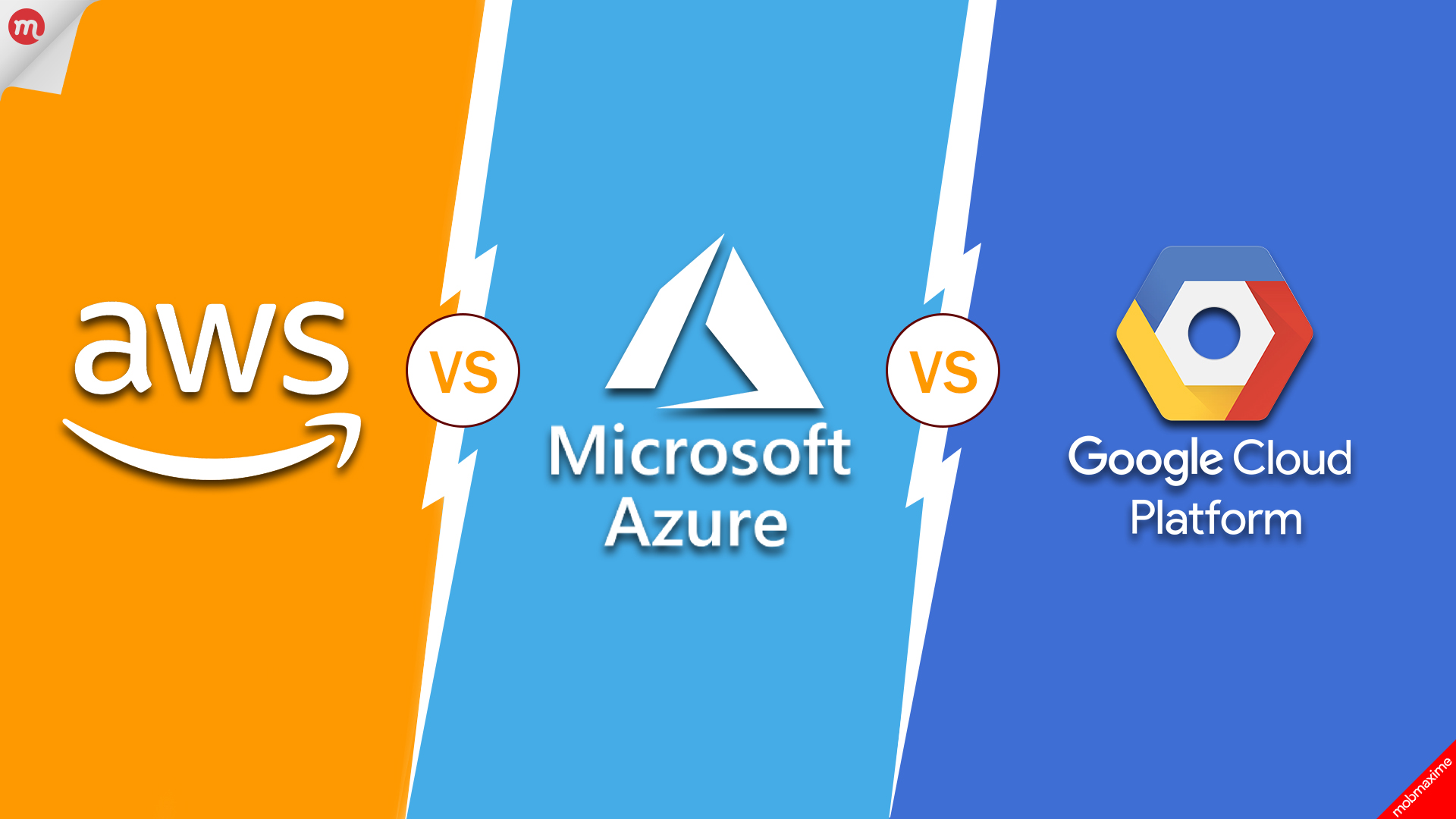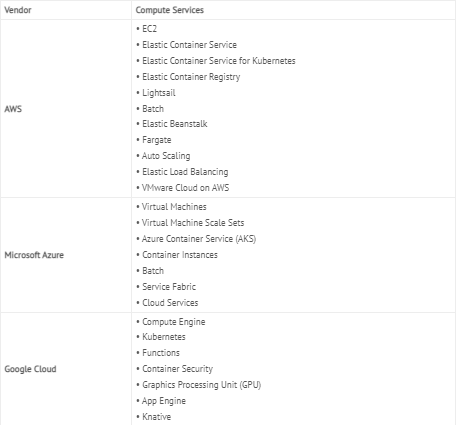AWS vs Azure vs Google Cloud: Difference Between Cloud Platforms

There is fierce competition in the cloud market between AWS, Google Cloud, and Azure. These three cloud services are the products of three major global organizations that also enjoy a global customer base and work relentlessly to build better services and products.
When getting Infrastructure as a Service (IaaS) and Platform as a Service (Paas) solutions, you need to understand the difference between AWS vs Azure vs Google Cloud. And this debate is essential because the question is not about whether you should have cloud computing, but which cloud service you need is important.
Today, we will conduct AWS vs Azure vs Google Cloud comparison to deeply identify their utility, performance, and applicability for your organization. Ensure to read through every factor of differentiation and relate the same with how your organization is working today and how it will work in the future.
Must Read: Saas vs PaaS vs Iaas: Choose the Right Cloud Computing Service Model
Introduction to AWS, Azure, and Google Cloud
Google Cloud
Google Cloud represents a collection of Cloud-based computing services that run on the same infrastructure that Google leverages internally for its end-user products like Google Search, YouTube, and others.
The Google Cloud journey in 2011, and since then, it has managed to establish a strong position in the cloud industry. Google Cloud was created with the intention of bolstering Google’s own products, such as the Google Search engine and YouTube.
However, they have now launched their enterprise services, allowing anyone to access the Google Cloud Platform, which is built on the same infrastructure as Google Search and YouTube.
Amazon Web Services (AWS)
Established and managed by the online marketing giant, AWS facilitates a paid-subscription model of on-demand Cloud Computing platform for single users (people), businesses, and governments.
Amazon Web Services is the cloud market’s oldest (2006) and most experienced service provider, which has to some extent, initiated this kind of service model in the industry. The experience and early market entry have given AWS a certain edge over the competitors regarding the user base (which is larger), trust, and reliability.
Azure
Microsoft’s Azure cloud computing solution was initiated in 2010 with the goal of providing organizations with a reliable Cloud Computing platform. In 2014, Azure was rebranded to ‘Microsoft Azure,’ while the term ‘Azure’ is still widely used.
Microsoft Azure has made significant progress in comparison to its competitors since its beginnings. One of the key benefits of using Azure is its ability to use a wide variety of cloud-based services without having to spend money on additional hardware components. This significantly brings down the installation and management cost of a cloud-computing system.
Difference Between AWS vs Azure vs Google Cloud | Factors
-
Zones of Availability
The availability zones are locations within the data center regions from where the public cloud services originate and are operated. A higher number of availability zones means a service provider can establish a stronger network of data centers while ensuring higher availability of services, less downtime, more uptime, and less lags.
- Google Cloud: As of December 2020. Google Cloud has 73 availability zones in 24 regions.
- AWS: Having 200 fully-featured data centers across the globe, AWS has 84 availability zones, expanding its operations in 245 countries.
- Azure: Microsoft Azure has over 54 regions with three availability zones in each region. This makes the number of zones to be 164.
Even though AWS is the oldest service provider, it is Microsoft Azure that has established a strong network of regions and availability zones across the globe. These many zones allow Azure to serve the cloud computing needs of organizations in over 140 countries, which is less than what AWS have accomplished.
-
Clients and Customers
You can easily get an idea of the capability of a cloud service by knowing who is using them. Almost every service and the digital solution you use via the web is somehow connected to the cloud.
Be it watching a movie on Netflix or using Google search. You are utilizing cloud computing services in some manner. While services like Google search or mail are free, things like Netflix, YouTube, etc., are paid.
So, here are a few companies using each of these cloud services.
- Google Cloud:
-
- HSBC
- PayPal
- Bloomberg
- Dominos
- Bloomberg
- YouTube
- Gmail
- Google Search
- AWS:
-
- Netflix
- Airbnb
- Samsung
- BMW
- Zynga
- Azure:
-
- Fujifilm
- HP
- Apple
- Johnson Controls
A noteworthy accomplishment of Azure here is that over 80% of the Fortune 500 companies use Azure cloud computing solutions for their processes and operations.
-
Compute Capabilities
In cloud computing, Compute refers to the concepts and objects associated with software computation. While it’s a generic term, compute includes computing factors like processing power, memory, storage, and networking capabilities. Higher levels of computer means better computational success in a cloud computing system.
- AWS: The AWS runs compute with Elastic Compute Cloud or EC2, which is meant to provide secure and resizable compute capacity to the cloud infrastructure.EC2 has a higher utility in that it supports a higher number of instances and is compatible with Windows and Linux operating systems. Plus, it can also work with a higher number of GPI instances giving the system high-performance computing capabilities along with auto-scaling. Besides Compute, AWS has also been adding additional services in the Containerization. It supports Docker, Kuberneters, and has its own Fargate services. Fargate brings the benefit of automating server and cluster management by using containers.In addition to this, AWS also provides virtual private cloud services in the form of Lightsail and Elastic Beanstalk, specifically for running and scaling web applications.
- Azure Compute: Microsoft Azure’s compute services are called Virtual Machines and it is compatible with Linux, Windows, Oracle, IBM, SAP, and SQL Server. With all these compatibility, the VMs in Azure are also better in terms of security and possess hybrid cloud capabilities. With this, you can also integrate several additional capabilities including instances and high-performance GPU options. Azure also brings the possibility of integrations like artificial intelligence and machine learning. In containerization, Azure has two container services; Azure Container, which is based on Kubernetes and another one, which use Docker Hub and Azure Container Registry for management purposes.
- Google Cloud Compute: Google’s Compute Engine is relatively smaller than the ones with Azure and AWS. It brings onboard both predefined and custom functions like predefined machine types, pre-second billing, and support of Linux plus Windows operating system.Moreover, you can also add automatic discounts and a carbon-neutral infrastructure, which is good because it substantially reduces energy consumption.Google Compute Engine is also set for containerization and microservices systems by connecting to Kubernetes.
Here is a list of computing services and systems integrated by the three cloud computing solutions.

-
Storage
The next point of differentiation in AWS vs Azure vs Google Cloud comparison is storage.
- AWS: AWS managed services for cloud computing leverage three different storage systems. While the Simple Storage Service (S3) is meant for object storage, Elastic Block Storage (EBS) is used in persistent block storage. Lastly, the Elastic File System (ELS) is used for file storage. This cloud computing service also has a Storage Gateway system representing a hybrid storage environment. Another one is Snowball used for physical hardware devices and can help transfer petabytes of data efficiently. When it comes to Database, AWS works with an SQL-compatible database service called Aurora. AWS also uses a relational database service (RDBS), Dynamo DBL, NoSQL database, and ElastiCache, which is an in-memory data store. While all these components help with efficient storage and data management, the Glacier service is used for long-term archival storage. Collectively, these systems make AWS a comprehensive data storage system, wherein the companies benefit from secure and efficient storage systems at low costs.
- Google Cloud: Google’s cloud computing system has been increasing in terms of market growth and customer base due to its hyper-active availability and unified object storage service. Not only does it make storing files, objects, and other data easier, but similar to AWS’s Snowball, the Transfer Appliance system lets you transfer data online with speed and efficiency. In database solutions, Google Cloud possesses SQL-based Cloud SQL and a relational database management solution, Cloud Spanner. These systems are meant to help with mission-critical workloads. For NoSQL database management, Google Cloud has Cloud Bigtable and Cloud Datastore.
- Azure: Microsoft Azure’s storage services include Blob storage meant for REST-based object storage. Primarily, this storage system is meant for unstructured data and a queue system for large-volume workloads and file and disk storage. For big applications and their storage requirements, Azure has a Data Lake Store. For database systems, Azure has three different SQL-based options. This includes SQL database, PostgreSQL, and MySQL. Plus, the data warehouse service, Cosmos Database and Table Storage for NoSQL. The Redis Cache service is an in-memory storage system used in Azure, whereas the Server Stretch Database is the hybrid storage service. These systems are specifically designed by Microsoft to fulfill the storage needs of organizations that are using Microsoft SQL Server.
-
Key Components and Features
While we have discussed the main aspects of running a cloud computing storage system above, some key features must be listed to give more clarity. To fully understand the difference between AWS vs Azure vs Google Cloud, let’s go through these features in brief. These are services and features used by the cloud computing platform to complete the command or facilitate an action.
For instance, API management is one of the functions an organization might use in the cloud computing system. For this purpose, Google Cloud uses Cloud Endpoints, Azure uses Azure API Gateway, and Amazon uses Amazon API Gateways. Similarly, we will list the function or parameter and the service these systems are using.
Function/Operation/Parameter Google Cloud Azure AWS Application Testing Cloud Test Labs DevTest Labs Device Farm Kubernetes Management Kubernetes Engine Kubernetes Service EKS Marketplace G Suite Azure AWS Virtual Network Subnet VNet VPC Caching CloudCDN RedisCache ElastiCache Content Delivery Network Cloud InterConnect Content Delivery Network by Azure CloudFront Infrastructure as a Service Google Compute Engine Virtual Machines Amazon Elastic Compute Cloud Platform as a Service Google App Engine App Service and Cloud Services AWS Elastic Beanstalk Serverless Functions Google Cloud Functions Azure Functions AWS Lambda Virtual Network Virtual Private Cloud Virtual Networks (VNets) Amazon Virtual Private Cloud (VPC) Peering Google Cloud InterConnect Express Route Direct Connect DNS Google Cloud DNS Azure DNS Amazon Route S3 Data Backup Services Nearline and Coldline Archive Storage Backup
Site Recovery
Glacier Security Cloud Virtual Network Azure Virtual Network Amazon Virtual Private Cloud Automation Cloud Load Balancing Load Balancing for Azure AWS Opsworks
These features and services can clearly demarcate the differences between AWS vs Azure vs Google Cloud.
Conclusion
Here you are, with a clear differentiation on AWS, Azure, and Google Cloud. Each one of them has distinct properties and benefits for an organization. If you want a cloud solution that has a better market presence, go with AWS, but if you are looking for more services, Azure and AWS are better. AWS offers more than 200 managed services along with a massive scope and a global network of data centers.
Google has become an expert in containerization systems and built the Kubernetes standard while specializing in high compute offerings. The Google Cloud platform is also more efficient with big data, machine learning, and other advanced services.
So, make sure to identify your organizational requirements before choosing a cloud computing service.
Join 10,000 subscribers!
Join Our subscriber’s list and trends, especially on mobile apps development.I hereby agree to receive newsletters from Mobmaxime and acknowledge company's Privacy Policy.
